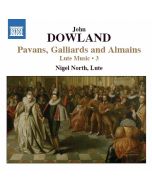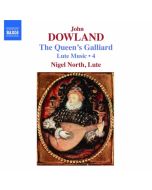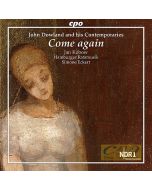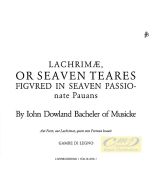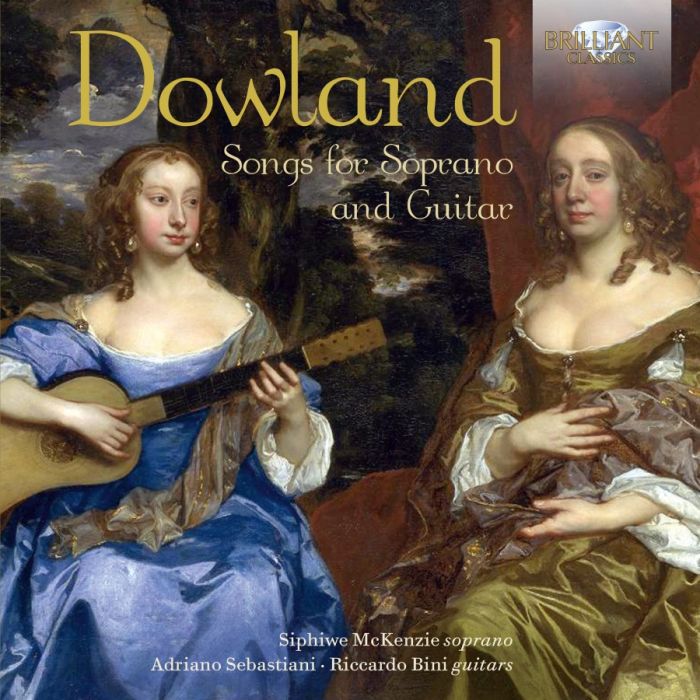
(Produkt nie został jeszcze oceniony)
kompozytor
Dowland, John
tytuł
Dowland: Songs for Soprano and Guitar
wykonawcy
Bini, Riccardo, McKenzie, Siphiwe, Sebastiani, Adriano
nr katalogowy
94480
opis
Renowned in his own time as a precociously adept diplomat – maybe spy – in the service of the English aristocracy, working across the Catholic-Protestant divide, John Dowland was appointed lutenist at the court of Christian IV of Denmark, a post that he held for eight years. A further six years later, in 1612, he finally secured the post as lutenist at the court of James I, a highly prestigious position that he had unsuccessfully applied for in 1594, during the reign of Elizabeth I. In 1621 he was awarded the title of “Doctor of Musicke”, and died five years later.
• Dowland: A Galliard in A
• Dowland: Come again, sweet love doth now invite
• Dowland: Flow my teares (Lacrimæ)
• Dowland: Frog Galliard
• Dowland: Galliard in B minor
• Dowland: Galliard in E minor
• Dowland: Go Crystal tears
• Dowland: If my complaints could passions move
• Dowland: Lady Hunsdon's Puffe
• Dowland: Lady Laiton's Almain
• Dowland: Lady Rich, her Galliard
• Dowland: Lord Strang's March
• Dowland: Mr Dowland's Midnight
• Dowland: Mrs White's Nothing, P. 56
• Dowland: Mrs Winter's Jump
• Dowland: My Lord Chamberlaine his Galliard
• Dowland: My Lord Willoughby's Welcome Home
• Dowland: My Thoughts Are Wing'd With Hopes
• Dowland: Now, O now, I needs must part
• Dowland: Orlando Sleepeth
• Dowland: Sir John Smith, His Almain
• Dowland: Tarleton's Riserrectione
• Dowland: Weepe you no more, sad fountaines
• Dowland: What if I never speed?
Works:
• Dowland: A Galliard in A
• Dowland: Come again, sweet love doth now invite
• Dowland: Flow my teares (Lacrimæ)
• Dowland: Frog Galliard
• Dowland: Galliard in B minor
• Dowland: Galliard in E minor
• Dowland: Go Crystal tears
• Dowland: If my complaints could passions move
• Dowland: Lady Hunsdon's Puffe
• Dowland: Lady Laiton's Almain
• Dowland: Lady Rich, her Galliard
• Dowland: Lord Strang's March
• Dowland: Mr Dowland's Midnight
• Dowland: Mrs White's Nothing, P. 56
• Dowland: Mrs Winter's Jump
• Dowland: My Lord Chamberlaine his Galliard
• Dowland: My Lord Willoughby's Welcome Home
• Dowland: My Thoughts Are Wing'd With Hopes
• Dowland: Now, O now, I needs must part
• Dowland: Orlando Sleepeth
• Dowland: Sir John Smith, His Almain
• Dowland: Tarleton's Riserrectione
• Dowland: Weepe you no more, sad fountaines
• Dowland: What if I never speed?
nośnik
CD x 1
wydawca
Brilliant Classics
data wydania
13.11.2019
EAN / kod kreskowy
5028421944807
55,00 zł
Produkt na zamówienie
Wysyłka ustalana indywidualnie.
Darmowa wysyłka dla zamówień powyżej 300 zł!
Darmowy kurier dla zamówień powyżej 500 zł!
sprawdź koszty wysyłki
